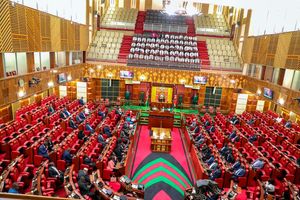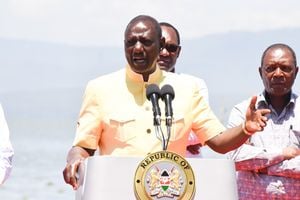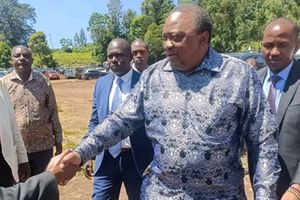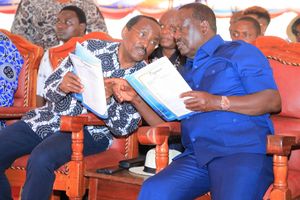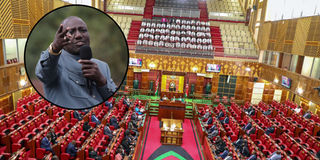
A past sitting at the National Assembly. By using public pronouncements that border on instructions and thinly veiled threats to the lawmakers, President William Ruto (inset) has had his way in the National Assembly and Senate.
The sailing of the contested Affordable Housing Bill has once again cast a spotlight on how President William Ruto continues to exploit his Kenya Kwanza alliance’s numerical strength in Parliament.
By using public pronouncements that border on instructions and thinly-veiled threats to the lawmakers, Dr Ruto has had his way in the National Assembly and Senate.
He achieved another victory on Wednesday when the National Assembly passed the bill that seeks to enact 1.5 per cent levy on workers’ pay to finance his housing project.
Azimio la Umoja One Kenya Coalition MPs walked out for reportedly being stopped from proposing changes. Opposition leader Raila Odinga accuses Parliament of being a captive of Dr Ruto.
On Friday, days before the Tuesday vote at the Second Reading stage, President Ruto told Kenya Kwanza lawmakers to hasten the passage of the bill “so that I can sign it into law to create jobs and grow the country’s economy”.
“I am telling MPs on the Affordable Housing Bill: Let’s finish pass it by Tuesday. Our youths have no jobs. Some are already on sites,” Dr Ruto said.
Some 141 MPs, – mostly from the ruling coalition – voted in support of the unpopular bill while 58 – mostly from the opposition – opposed it.
A total of 149 lawmakers, however, skipped the vote. Some are said to have opted for the route to avoid being accused of defying the President.
Earlier, National Assembly Majority Leader Kimani Ichung’wah said the levy would come into effect before the March payroll.

President William Ruto, his Deputy Rigathi Gachagua, Kenya Kwanza MPs and Cabinet Secretaries at the ongoing joint National Executive Retreat and Parliamentary Group consultative meeting in Naivasha on February 19, 2024.
“We should conclude that business on Tuesday, hopefully on Wednesday afternoon we get into the third reading…and process it and forward to the Senate so that they advertise it by Friday, do the public participation and get a new Affordable Housing Bill before the next payroll,” Mr Ichung’wah said.
The ruling alliance has also been exploiting the provision of the Standing Order which allows the reducing of publishing a bill from 14 days to two.
The Executive has also arm-twisted Parliament by ensuring regulations of controversial bills are brought after MPs have passed the legislation.
Procedurally, regulations that provide the legal framework on how a law would be implemented are supposed to be considered by the Committee on Delegated Legislation before a law takes effect.
President Ruto has ensured Parliament passes the bills, they are assented to then regulations come later.
This blocks MPs, especially opposition ones, from scrutinising details that may raise a red flag.
For instance, the Hustler Fund – one of the key pledges Dr Ruto made during his campaigns – was passed hurriedly, with MPs literally dragged out of committees to the House to provide the requisite quorum.
Till now, details of the regulations guiding the operations of the Fund have not been considered by the House.
The Social Health Insurance Fund (SHIF) Bill was hurriedly passed and signed into law but regulations of the Fund are yet to be considered by the House.
Sources told the Sunday Nation that the Executive is always adamant on MPs passing its bills in the very nature that they have been drafted with minimal or no amendments.
Kenya Kwanza lawmakers who propose changes that are deemed to be against the proposed law are coerced to drop them or threatened with unspecified consequences.
National Assembly Majority Whip Silvanus Osoro denies the claim, saying Kenya Kwanza MPs and the Executive have shared dreams.
He says they campaigned on the same platform and, therefore, have to ensure their manifesto is implemented.
“The Housing project was part of the plan we launched in Kasarani before the 2022 elections. We won the election and are actualising it on all levels – the Executive and the legislature,” he said.
“The President does not need to convince anybody at this moment. If it is his way, it is our way too.”
Proposed amendments by the minority side are dropped on technicalities or not admitted in order to avoid filibustering and delay in the consideration of the bill.
This leaves the opposition with no option but to watch helplessly as the clauses are passed in chorus by the majority side or walk out in droves and pursue other options such as going to courts or resorting to lynching the government through the court of public opinion at rallies or funerals.
Azimio MPs, including Minority Whip Junet Mohamed, walked out of the House when the Affordable Housing Bill was in the Third Reading stage (Committee of the whole), saying they could not participate in an illegality.
Mr Mohamed said the minority side presented amendments, which were ignored and not put in the order paper.
During the joint Executive and Parliamentary Group retreat in Naivasha, Nakuru County, Dr Ruto told lawmakers that the Affordable Housing Bill must be passed.
MPs, at times, are caught offguard as a Supplementary Order paper with an important agenda is published when they have already left the House.
While passing the Finance Bill last year, some opposition MPs who were not in the House accused Speaker Moses Wetang’ula of changing his earlier commutation to the House that the crucial vote would be taken the following day, only to subject the bill to division when some of the lawmakers had left.
Mr Wetang’ula told off the MPs, saying they are supposed to be in the House until it adjourns.
Though Parliament does public participation as the Constitution demands, the views from stakeholders are either ignored or knocked out on a technicality.
Committee chairpersons are also normally on the spot as the Executive demands that bills that form part of core promises made by Kenya Kwanza during campaigns are passed without changing anything, even a comma.
Minority Leader, Opiyo Wandayi, accuses the Executive of misusing its majority in the House to hurriedly push through legislation due to fear of being criticised in debates.
“Their intolerance of alternative viewpoints is, perhaps, what drives them to rush House business. They have an unexplained fear of criticism...hence their determination to shorten debates,” Mr Wandayi said.
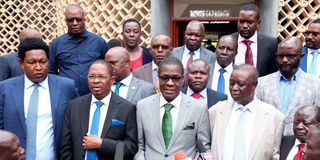
MPs led by National Assembly Minority Leader Opiyo Wandayi and his Senate counterpart Stewart Madzayo (front: second left) address the media at Parliament Buildings on March 22, 2023.
According to the Ugunja lawmaker, the hurried nature of considering bills in the House in disregard of the law is what has made courts to quash certain legislations passed.
“Where decisions of Parliament have ended up in Court, the minority side has been vindicated on many occasions. This needs to be a wake-up call to Kenya Kwanza. Stifling independent thought and criticism is counter-productive. We, in Azimio, will remain steadfast and continue to say it as it is in defence of public good,” he said.
Nominated MP, John Mbadi, says Parliament has lost its independence.
“We cannot have a situation in which the President attends a rally and orders Parliament to pass a bill by a certain day. It’s embarrassing,” Mr Mbadi said.
“It is clear that the National Assembly and Senate cannot stop Ruto. Public participation is a waste of resources. MPs are being used as conveyor belts.”


